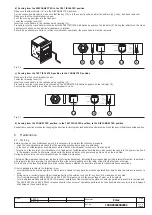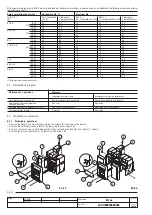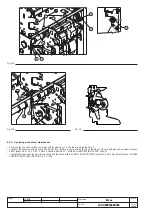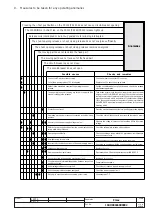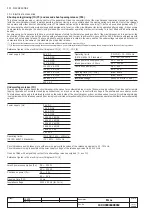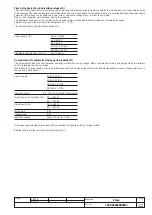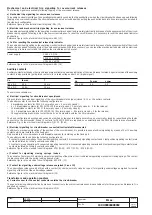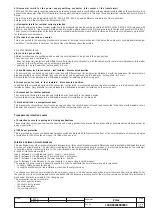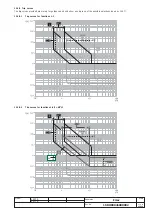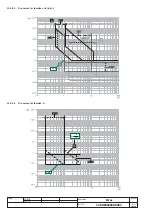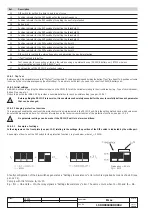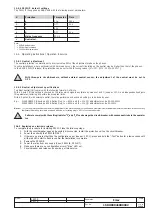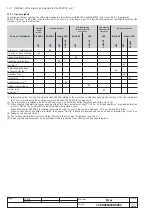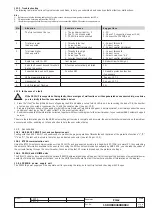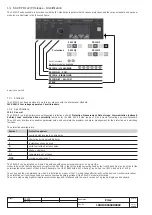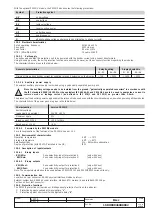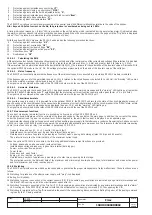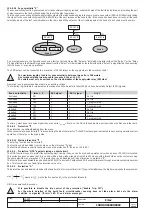
L2234
L2778
Emax
33/158
Model
Scale
Page No.
Doc. No.
Apparatus
1SDH000460R0002
12.2.6.2
Protection “S”
This protection can be disabled; it can be of the fixed time (t=k) or inverse time (t=k/I
2
) type; in the latter case, the trip time is given by the expression:
where l
f
> l
2
I
f
is the fault current and I
2
the protection threshold, established by the user.
NB: Time expressed in seconds.
12.2.6.2.1
Thermal memory “S”
The thermal memory function can be enabled for cable protection when the curve with inverse time is selected. This is based on the "tS" parameter
defined as the trip time of the curve (t2) selected at 1.5xI2. The other characteristics are the same as those for thermal memory "L" (see par. 12.2.6.1.1).
max
100 t
2
(I )
f
2
, t
2
12.2.6 Description of the protection functions
12.2.6.1
Protection “L”
The "L" is the only protection that cannot be disabled because it is for self-protection against overloading of the relay itself.
The type of curve that can be set is t=k/I
2
.
The inverse-time protection trip time is given by the expression
:
where l
f
<
12ln
, 1 s where
l
f
>
12
ln
I
f
is the fault current and I
1
the protection threshold, established by the user.
NB: Time expressed in seconds.
12.2.6.1.1 Thermal memory “L”
The thermal memory function can be enabled to protect the cables. It is based on the “
τ
L” parameter defined as trip time of the curve (t1) selected
@1.25xI1. This function can be enabled through PR010/T, SD-Testbus2 or SD-Pocket.
The trip time of the release surely is 100% of the time selected after a
τ
L time has elapsed from the last overload or last trip, or else trip time will
be reduced depending on the overload and time elapsed.
PR121/P is equipped with two instruments to make up this thermal memory. The first one is only effective when the release is powered (it also records
overloads that have not lasted long enough to trip the release); the second operates even when the release is not powered, reducing any trip
times when it closes again straight after and is enabled as soon as the circuit-breaker is tripped.
The PR121/P release determines which one to use according to the situation.
max
9 t
1
(I / I )
f
1
2
, 1
12.2.6.3 Protection “I”
This protection can be disabled; it is of the fixed time (t=k) type, and is designed for a nil intentional delay.
12.2.6.4
Protection “G”
This protection can be disabled; it can be of the fixed time (t=k) or inverse time (t=k/i
2
) type; in the latter case, the trip time is given by the expression:
where l = l
f
/l
4
I
f
is the fault current and I
4
the protection threshold, established by the user.
NB: Time expressed in seconds.
The PR121/P unit can provide earth fault protection, achieved inside the relay by vectorially adding together the phase and neutral currents. The
fault current is defined by the following formula:
If the circuit reveals no faults, the module of the sum of these currents is always nil; vice versa, the value of the fault current takes on a larger and
larger value depending on the entity of the fault.
12.2.6.5
Protection against instantaneous short-circuit "Iinst"
This function has a single fixed-time protection curve.
When the protection is tripped, the circuit-breaker is opened by the opening solenoid (TC).
max
2
I
2
, t
2

